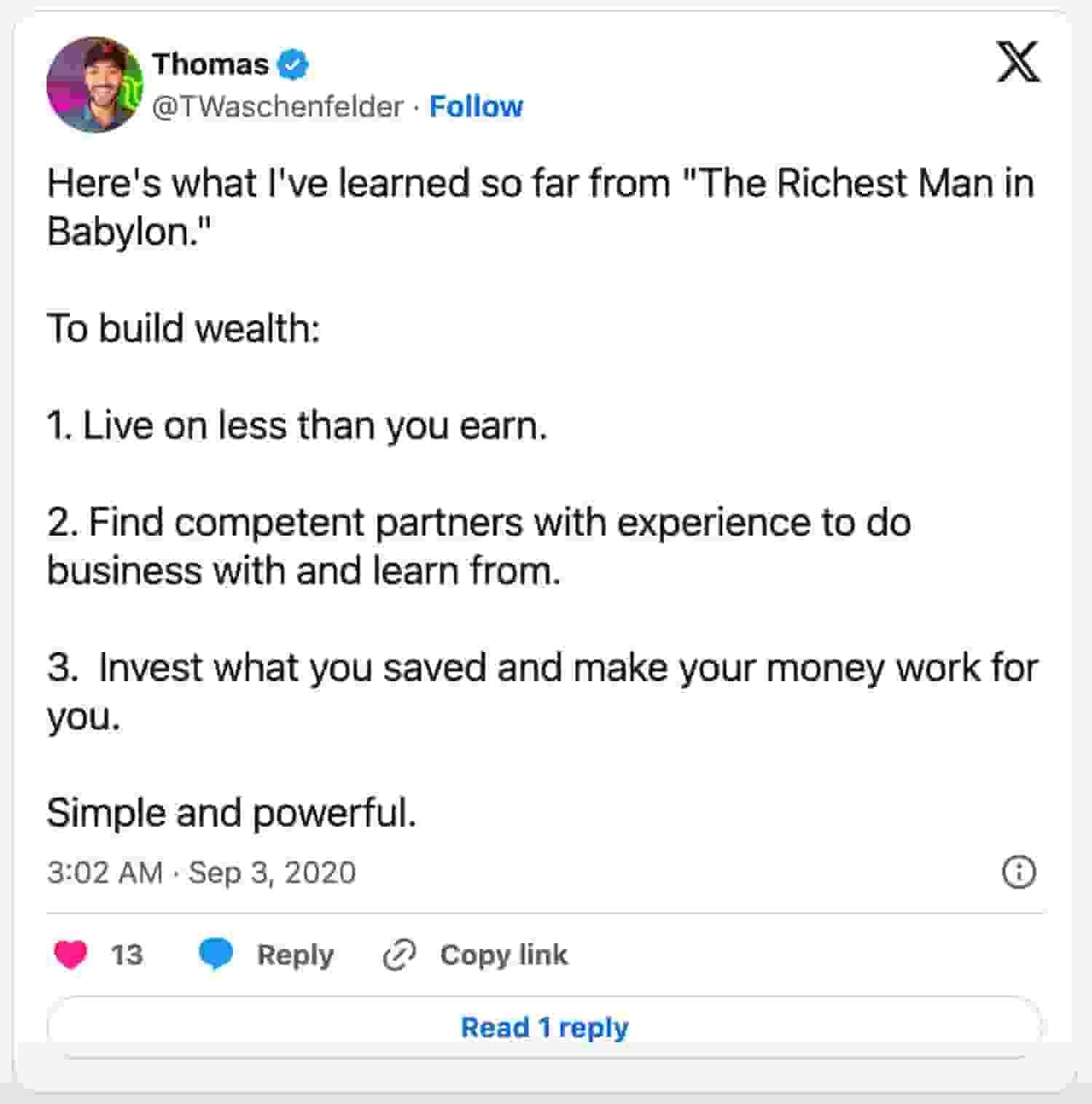Seven Cures for a Lean Purse: Wealth Creation Lessons From “The Richest Man In Babylon”
There is power in simple and obvious ideas. The simple steps to wealth creation described in George S. Clason’s classic book, The Richest Man in Babylon, is an excellent example of this.
The Richest Man in Babylon uses “Seven Cures for a Lean Purse” to overview basic financial principles. Clason delivers these through the wealthy and wise character of Arkad, who lives in the ancient city of Babylon 4,000 years ago.
While Clayson wrote the book in 1926, the principles remain as relevant as ever. Plus, they are easy to understand and apply. They include:
Start thy purse to fattening.
Control thy expenditures.
Make thy gold multiply.
Guard thy treasures from loss.
Own thy own home.
Insure a future income.
Increase thy ability to earn.
Here are seven simple steps to wealth creation from The Richest Man in Babylon:
Seven Cures for a Lean Purse
1. Pay yourself first using the skills you already have.
“Start thy purse to fattening.”
Arkad first advises his followers to use their skills to start building wealth by saving 10% of their annual income. Arkad says:
Ye can see that there are many trades and labors at which men may earn coins. Each of the ways of earning is a stream of gold from which the worker doth divert by his labors a portion to his own purse.
For every ten coins thou placest within thy purse take out for use but nine. Thy purse will start to fatten at once, and its increasing weight will feel good in thy hand and bring satisfaction to thy soul.
Pay yourself first. Whatever it is you do for a living, put 10% of your salary away into a savings account, and do not touch it. Arkad says you’ll barely notice that it’s gone.
And over time, that savings account will grow, bringing “satisfaction to thy soul.”
2. Keep your expenses low.
“Control thy expenditures.”
Arkad tells his followers to avoid luxury expenditures that come to disguise themselves as necessities:
What each of us calls our ‘necessary expenses’ will always grow to equal our incomes unless we protest to the contrary… Confuse not the necessary expenses with thy desires… Study thoughtfully thy accustomed habits of living. Herein may be most often found certain accepted expenses that may wisely be reduced or eliminated.
Keep your expenses low. Take a hard look at what comes out of your bank account and see if there’s anything you can cut. This will increase your savings rate and allow you to build wealth faster.
3. Invest what you save.
“Make thy gold multiply.”
After building up their savings and cutting expenses, Arkad advises his students to invest their savings to compound their money:
The gold we may retain from our earnings is but the start. The earnings it will make shall build our fortunes… To put each coin to laboring that it may reproduce its kind… a stream of wealth that shall flow constantly into thy purse… an income that continueth to come whether thou work or travel.
By investing in interest-generating assets, you’ll grow your wealth by compounding not only your initial investment but also all the interest the principal has generated previously.
And as Arkad eludes to, this is income you don’t have to actively “work” for. You can make money while you sleep, vacation, or travel.
4. Protect your investments from loss.
“Guard thy treasures from loss.”
Arkad then tells his students to protect their principal from loss by avoiding “get rich quick schemes” or other investment vehicles with huge downside risk. He says:
Gold in a man’s purse must be guarded with firmness, else it be lost… Is it wise to be intrigued by larger earnings when thy principal may be lost? I say not. The penalty of risk is probable loss. Study carefully, before parting with thy treasure, each assurance that it may be safely reclaimed. Be not misled by thine own romantic desires to make wealth rapidly.
Don’t put your money at risk to get rich quickly. Look for reputable money managers and investment vehicles to put your money into. Slow and steady investing will get you rich over the long term.
5. Invest in a home.
“Own thy own home.”
Arkad next tells his students to purchase a home instead of renting one to live in:
I recommend that every man own the roof that sheltereth him and his. Nor is it beyond the ability of any well-intentioned man to own his home… When the house be built, thou canst pay the money lender with the same regularity as thou didst pay the landlord. Because each payment will reduce thy indebtedness to the money lender, a few years will satisfy his loan.
By purchasing a home, you are building equity in an asset instead of paying money to someone else for rent. Also, homes generally appreciate in value over time. So not only are you building equity, your equity will likely increase in value while you own the house.
6. Invest for retirement.
“Insure a future income.”
Arkad advises next that his students start investing now for retirement:
It behooves a man to make preparations for a suitable income in the days to come, when he is no longer young, and to make preparations for his family should he be no longer with them to comfort and support them. This lesson shall instruct thee in providing a full purse when time has made thee less able to learn… Provide in advance for the needs of thy growing age and the protection of thy family.”
The sooner you start compounding your money, the more money you’ll have to live off of when you choose to retire. Investing in your pension or a tax-free retirement account will provide you with cash for you and your family to live off when you’re much older.
7. Learn new skills to increase your income.
“Increase thy ability to earn.”
Arkad tells his students to keep learning new skills and knowledge to become a better investor and earn more money:
The more of wisdom we know, the more we may earn. That man who seeks to learn more of his craft shall be richly rewarded… Always do the affairs of man change and improve because keen-minded men seek greater skill that they may better serve those upon whose patronage they depend. Therefore, I urge all men to be in the front rank of progress and not to stand still, lest they be left behind.
In the age of the internet, you can learn valuable skills almost for free.
As Naval Ravikant says:
Learning is a life long process. And the more you learn, the more income you can demand in a free market.
These 7 Steps Are Simple, But Not Easy.
It takes discipline to apply these seven simple steps to wealth creation.
But over a lifetime, they can make the difference between you having the freedom of your time or having to work for someone else as you get older.
Start now.
If You Want More Ideas Like This, Follow Me On Twitter And Subscribe To My Newsletter:
—
Clason, George S.. The Richest Man in Babylon. Pandora's Box. Kindle Edition.






